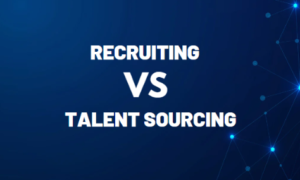
Recruiters find candidates and deal with hiring managers right? If you are in the recruiting industry or are a hiring manager you likely have some knowledge of the fact that there are sourcers and recruiters but did you know these are two very different roles? There are definitely some similarities and overlap in job function, but the day to day of a sourcer will be very different than that of a recruiter.
It is a common misconception among those unfamiliar with the distinction between sourcers and recruiters that the former is an entry-level role while the latter is a more senior position. However, it is not necessarily true that all sourcers progress to become recruiters. The career path for sourcers and recruiters can vary, and moving from a sourcer to a recruiter is not always the natural progression.
How are Recruiters and Sourcers different?
1. Talent Sourcers
Sourcers are the masters behind the scenes that spend their days searching for that perfect candidate. They aren’t waiting for candidates to apply via the applicant tracking system. No hiring managers, the perfect candidate does not usually apply to your job posting! These super sleuths are combing the internet using all kinds of search techniques.
They are using ways to find and engage those passive candidates who aren’t actively looking for jobs. They are connecting with groups and cultivating relationships. They even have technical skills searching using things like Boolean to hunt that perfectly qualified candidate!
Sourcers often have to meet a goal for a certain amount of qualified candidates they produce. They may even be paid by commissions for the candidates they find that are eventually hired. While this adds to the incentive, it can also add to the stress.
If you prefer to be in the background, being a sourcer is likely a better choice for you. You will still have some client interaction, but you won’t have too much involvement with hiring managers. As Appliview points out, sourcers are often the first contact a candidate has with a company. This is a great position if you love researching and enjoy a good search.
2. Recruiters
Recruiters are the face for the business. They are the sales people who sell the candidates and work with hiring managers to understand what they are looking for. You will need a thick skin for this role because you will be the one managing the manager’s expectations.
You will need a massive amount of emotional intelligence to gauge how managers are feeling. Part of being a recruiter is making sure managers are satisfied and providing things for them before they ask. Educating the managers on the recruiting process is key. While they think they know it all, you will need to help them understand the reality.
Communication will need to be a strong skill set for you to be successful in this role. You need to be able to understand what the hiring manager is looking for and be able to articulate it to the sourcer. In addition, you will have to keep managers in the loop in terms of any obstacles that occur. Without these skills you likely will run into issues that could have otherwise been avoided.
Recruiting can be very rewarding. With your constant interaction with hiring managers you get a sense for the challenges they go through. Being able to guide them through the recruiting process and find a good fit for their role can really provide a sense of accomplishment.
The Power of Both
One of the reasons people move into recruiting from sourcing or vice versa is that they know what it is like to work on the other side. A sourcer will know how long it will take to find a difficult skill set and will be able to clearly articulate what the time frame will be to the manager. While a sourcer who has been a recruiter realizes the pressure the hiring managers face to fill their opening.
Like with any position, having experience in several areas will make you a stronger employee. Even if you like one side better than the other, it will benefit you to earn experience in both areas to strengthen your skills. Knowing first-hand what happens in the other area will help you articulate it as well.
The experience of having worked as a sourcer will help you think about your recruiting role more holistically and come up with ideas you may not have otherwise had. As a sourcer with experience as a recruiter, you may think about your search in another way or bring questions to the recruiter for the client to think about. Together the sourcer and the recruiter make a great team and can help hiring managers fill their roles with outstanding candidates.
Here’s a video that explains recruiting and sourcing well:
I wrote a post about tracking recruiting metrics that both Sourcers and Recruiters can learn from (here)
Recommended Reading:
How to Send A Text Message Using Email
How to Make Your Work Culture Authentic
The Sourcing Function Matters Within Recruiting
- AI Search Will Transform Talent Sourcing Forever - January 10, 2025
- Build an AI Sourcing Assistant using ChatGPT 4 - January 10, 2025
- Top Recruiting Leaders to Follow in 2025 - January 8, 2025
